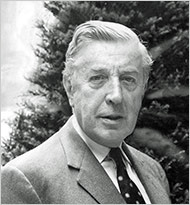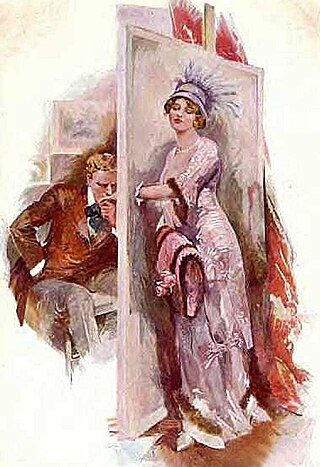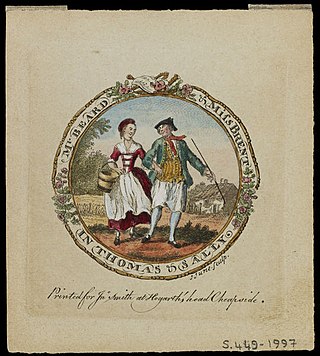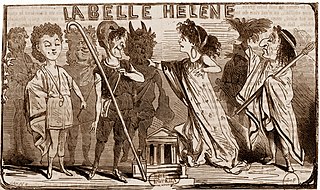Related Research Articles

Jacques Offenbach was a German-born French composer, cellist and impresario. He is remembered for his nearly 100 operettas of the 1850s to the 1870s, and his uncompleted opera The Tales of Hoffmann. He was a powerful influence on later composers of the operetta genre, particularly Franz von Suppé, Johann Strauss II and Arthur Sullivan. His best-known works were continually revived during the 20th century, and many of his operettas continue to be staged in the 21st. The Tales of Hoffmann remains part of the standard opera repertory.

Sir Frederick William Mallandaine Ashton was a British ballet dancer and choreographer. He also worked as a director and choreographer in opera, film and revue.

Idomeneo, re di Creta ossia Ilia e Idamante is an Italian-language opera seria by Wolfgang Amadeus Mozart. The libretto was adapted by Giambattista Varesco from a French text by Antoine Danchet, based on a 1705 play by Crébillion père, which had been set to music by André Campra as Idoménée in 1712. Mozart and Varesco were commissioned in 1780 by Karl Theodor, Elector of Bavaria for a court carnival. He probably chose the subject, though it may have been Mozart. The work premiered on 29 January 1781 at the Cuvilliés Theatre in Munich, Germany.
Alan Opie is a British baritone, primarily known as an opera singer.
The English Opera Group was a small company of British musicians formed in 1947 by the composer Benjamin Britten for the purpose of presenting his and other, primarily British, composers' operatic works. The group later expanded to present larger-scale works, and was renamed the English Music Theatre Company. The organisation produced its last opera and ceased to run in 1980.

Barbe-bleue is an opéra bouffe, or operetta, in three acts by Jacques Offenbach to a French libretto by Henri Meilhac and Ludovic Halévy based on Charles Perrault's 1697 story.

La Grande-Duchesse de Gérolstein is an opéra bouffe, in three acts and four tableaux by Jacques Offenbach to an original French libretto by Henri Meilhac and Ludovic Halévy. The story is a satirical critique of unthinking militarism and concerns a spoiled and tyrannical young Grand Duchess who learns that she cannot always get her way.

The Count of Luxembourg is an operetta in two acts with English lyrics and libretto by Basil Hood and Adrian Ross, music by Franz Lehár, based on Lehár's three-act German operetta Der Graf von Luxemburg which had premiered in Vienna in 1909. Lehár made amendments to his Viennese score to accommodate the two-act adaptation. He also interpolated into the score three new pieces: a waltz that he had written for a commemorative performance of Der Graf in Vienna; a song from his first operetta, Wiener Frauen; and a Russian dance from the opera Tatjana.

Edward Geoffrey Toye, known as Geoffrey Toye, was an English conductor, composer and opera producer.
Eric Crozier OBE was a British theatrical director, opera librettist and producer, long associated with Benjamin Britten.

Rosemary Ashe is an English stage actress and singer.

Le droit d'aînesse is an opéra bouffe, a form of operetta, in three acts by Francis Chassaigne with a French libretto by Eugène Leterrier and Albert Vanloo. It premiered in Paris in 1883. An English-language version titled Falka, with a libretto translated and adapted by Henry Brougham Farnie, was successfully premiered in London later that year followed by productions throughout the English-speaking world.
Brian James Large is a television director and author. He is among the world's foremost TV directors specializing in opera and classical music.

Thomas and Sally is a dramatic pastoral opera in two acts by the composer Thomas Arne with an English libretto by Isaac Bickerstaffe. The opera was meant to be performed as an "after piece", which is a short musical work to be performed after a spoken play.
Charles Jefferys was an English music publisher and composer of songs.

La belle Hélène is an opéra bouffe in three acts, with music by Jacques Offenbach and words by Henri Meilhac and Ludovic Halévy. The piece parodies the story of Helen of Troy's elopement with Paris, which set off the Trojan War.

John James Fryatt was an English actor and opera singer best known for his performance in comic character roles.
The Intimate Opera Company was an English opera company based in London which specialized in performances of chamber operas. Founded in 1930 by British baritone and impresario Frederick Woodhouse, the company was established with the professed aim of reviving forgotten chamber operas of the past. Most of the company's productions were produced on a smaller scale, using only piano accompaniment, costumes, minimal sets, and no props.

La Dori, overo Lo schiavo reggio is a tragi-comic opera in a prologue and three acts composed by Antonio Cesti to a libretto by Giovanni Filippo Apolloni. It was first performed in the court theatre at Innsbruck in 1657. The story is set in Babylon on the shores of the Euphrates and is a convoluted tale of mistaken identities—a female protagonist who disguised as a man eventually regains her lost lover, and a man disguised as a woman who causes another man to fall in love with him. In several respects it resembles the plot of Cesti and Apolloni's earlier opera L'Argia and foreshadows Apostolo Zeno's libretto for Gli inganni felici (1695) and Metastasio's libretto for L'Olimpiade (1733). The first Italian staging of La Dori was in Florence in 1661 for the wedding of Cosimo III de' Medici, Grand Duke of Tuscany. It subsequently became one of the most popular operas in 17th-century Italy. The opera was revived three times in the 20th century, beginning in 1983.
Our Man in Havana is an opera in three acts composed by Malcolm Williamson to a libretto by Sidney Gilliat based on Graham Greene's 1958 novel Our Man in Havana. Williamson's first full-scale opera, it was premiered on 2 July 1963 at Sadler's Wells Theatre in London.
References
- 1 2 3 4 5 6 7 Blyth, Alan, Jacobs, Arthur. The English Eccentrics. In: The New Grove Dictionary of Opera . Macmillan, London & New York, 1997. p1278.
- ↑ L'Intransigeant, Lundi 23 novembre 1925, La semaine des amateurs de T.p.S.F (Suite de programmes de Londres), Vendredi 27 Novembre, p7.
- ↑ Lamb, Andrew. The Misses Radford - Andrew Lamb celebrates two Cornish opera pioneers. Opera , July 2019, Vol 70 No 7, p824.
- ↑ Blyth, Alan. Intimate Opera. Opera, September 1973, Vol.24 No.9, p783-784.
- ↑ Stuart, Charles. Frederick Woodhouse and Intimate Opera. The Musical Times , Vol. 92, No. 1298 (Apr., 1951), pp. 153-158.
- ↑ "Thomas and Sally". IBDB.com. Internet Broadway Database.
- ↑ Internet Broadway Database search for Geoffrey Dunn, accepted 6 July 2024.
- ↑ “Academy and College Notes.” The Musical Times, vol. 76, no. 1103, 1935, pp. 62–64. JSTOR, http://www.jstor.org/stable/949148. Accessed 28 July 2024.
- ↑ “Academy and College Notes.” The Musical Times, vol. 77, no. 1122, 1936, pp. 742–44. JSTOR, http://www.jstor.org/stable/920454. Accessed 24 July 2024.
- ↑ Kennedy, Michael. The Work of Ralph Vaughan Williams (2nd edition). Oxford University Press, Oxford and New York, 1980, p251.
- ↑ Cobbe, H. The Letters of Ralph Vaughan Williams 1895-1958. Oxford University Press, Oxford and New York, 2008, p257.
- ↑ Salter, Lionel. The Birth of TV Opera. Opera, March 1977, Vol 28 No 3 p234-239.
- ↑ Jacobs, Arthur. London Opera Diary - Don Giovanni. Sadler's Wells Opera at the Coliseum, September 9. Opera, November 1968, Vol.19, No.11 p920-921.
- ↑ Jacobs, Arthur. La Belle Hélène. New Sadler's Wells Opera at Sadler's Wells Theatre. Opera, December 1988, Vol.39 No.12, p1490.
- 1 2 Dunn, Geoffrey. 'Murder in the Cathedral' - Play into Opera. Opera, June 1962, Vol.13 No.6, p368.
- ↑ Szymanowski - König Roger, Universal Edition site accessed 9 July 2024.
- ↑ Booklet accompanying Unicorn LP set RHS 343-5, Nielsen: Saul & David, recorded 1972, issued 1977.
- ↑ Arundell, Dennis. The story of Sadler's Wells, 1683-1977. David & Charles, Newton Abbot, 1978, p.224, 226, 228.
- ↑ Amis, John. Opera Diary, London Opera Club : Fortune Theatre. The Triumph of Virtue (Alessandro Scarlatti). February 19. Opera, Vol.2 No.6, May 1951, p313-314.
- ↑ Late Joys - at The Players' Theatre. T V Boardman & Company Limited, London, 1943 (autobiographical note on p81, photo singing 'That is Love').
- ↑ Geoffrey Dunn and Vida Hope arguing during a scene from 'The Streets Of London', on stage in London, 5th December 1942. Picture Post - 1320 - The Streets of London - pub. 1943, photo by Felix Man at gettyimages accessed 26 July 2024.
- ↑ Wallace, Ian. My Days at the Cambridge Theatre. Opera, September 1975, Vol.29 No.9, p827.
- ↑ Search results for Geoffrey Dunn at the British Universities and Colleges Film and Video Council accessed 28 July 2024.
- ↑ Queen of Spades, The (1949), BFI screenonline accessed 28 May 2024.
- ↑ Geoffrey Dunn - BFI